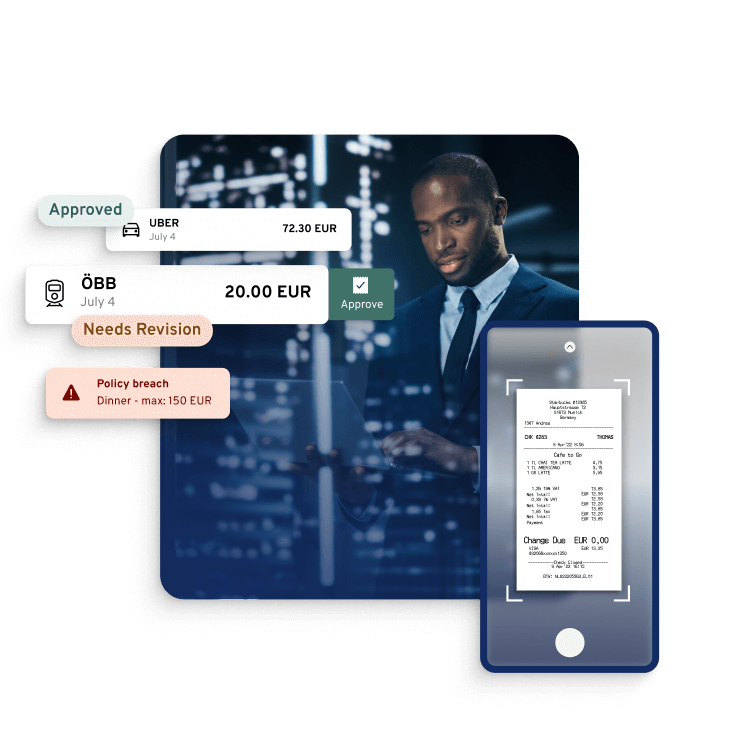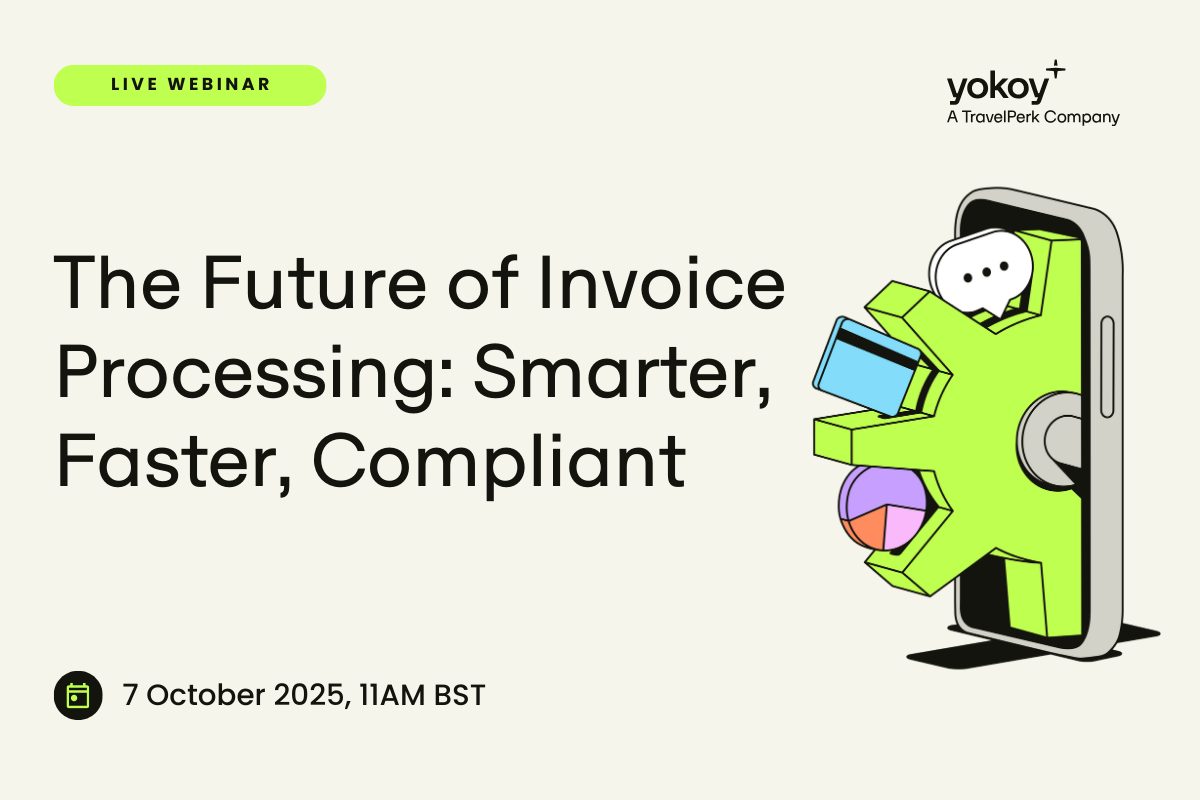Home / How To Keep Track of Business Expenses
How To Keep Track of Business Expenses
- Last updated:
- Blog
Managing and monitoring expenses is not just a necessity; it is the secret to financial health and growth. Whether you’re steering the ship as a CFO in a big company, crunching numbers as a finance professional, or checking transactions as an accountant for a small business: The following insights with helpful strategies around effective methods for business expense tracking promise to transform your approach to expense management. Because after all, you want the process to be a dynamic and engaging part of your business strategy.
What are common business expenses?
Business expenses cover all occurring costs related to day-to-day necessities such as rent, office supplies and utilities to more overarching costs like employee salaries and larger investments in equipment, services or property. This mix of operational, administrative, and capital expenditures has a crucial impact on the financial well-being of any organisation. By recognising and understanding the nature of common business expenses and what effort comes with it, companies can navigate their financial position more effectively, fostering growth and operational efficiency.
Common business expenses are:
- Employee salaries and benefits
- Fees for freelancers
- Rent or lease payments
- Utilities (electricity, water, gas, and internet)
- Insurance premiums
- Marketing and advertising
- Office supplies and equipment
- Professional fees
- Travel and accommodation
- Loan interest and repayments
- Depreciation
Check out our newsletter
Don't miss out
Join 12’000+ finance professionals and get the latest insights on spend management and the transformation of finance directly in your inbox.
Dealing with business expenses: 5 common pain points
Knowing about the typical pain points of expense management enables you to establish a more secure and compliant financial ecosystem. Here is what to look out for and tackle step by step by implementing useful expense management software.
1. Inefficiencies in manual processes: Traditional expense management processes rely on plenty of manual tasks, including a thorough check of paper receipts. This can occupy you or your team for hours.
- The solution: Transitioning to an automated expense management software like Yokoy’s can alleviate these inefficiencies by streamlining tasks, reducing manual workloads and freeing resources for enterprises.
2. Labourous receipt management and documentation: Managing and documenting receipts manually can be cumbersome. Even worse: More mistakes happen when we deal with receipt management and documentation manually.
- The solution: Upload receipts with smart receipt scanning technology to capture data and store them safely in your expense management software. This ensures accuracy, simplifies bookkeeping, and smoothens the documentation process.
3. Complex approval processes: Traditional approval workflows can be a time-consuming matter to distinguish possible personal expenses from actual business costs.
- The solution: Expense management software introduces automation to approval processes. An employee expense, credit card transactions, or other business costs can be matched with additional data, receipts and proposals. This can simplify workflows, reduce delays, and ensure a more streamlined and transparent approval chain.
4. Difficulties in categorisation and analysis: Categorising and analysing expenses manually can be challenging, leading to potential errors and inconsistencies.
- The solution: Good expense tracking apps and software use advanced categorisation algorithms and analytical tools, providing real-time insights into expenditure patterns with precision.
5. Expense fraud and non-compliance: Manual processes often lack robust mechanisms to prevent expense fraud and ensure compliance with finance and safety policies.
- The solution: Helpful expense management tools come equipped with built-in compliance features, fraud detection algorithms, and audit trails, fortifying the system against fraudulent activities and ensuring adherence to regulations.
Another pillar of good expense management: is creating thorough expense reports. They can provide you with a record of all expenditures and transactions, are essential for ensuring compliance with financial regulations, and assist you in keeping transparency. But there is even more potential waiting to be unlocked if you are willing to go beyond Excel: Reports offer valuable strategic insights into your company’s spending habits. This data empowers you to make truly informed decisions and minimise mistakes that could affect your business.
Blog article
Automated Expense Reporting: Simplify Expense Tracking and Maximize Compliance
Automated expense reporting helps you simplify expense tracking, enforce compliance, and streamline your expense management workflows. See how it works.

Lars Mangelsdorf,
Co-founder and CCO
Why proactive expense tracking is key
Embracing proactive expense tracking is not just about numbers; it is about saving precious time and company money. By ditching manual data entry and embracing automation, businesses can cut down on hours spent wrestling with paperwork. On top, you can minimise the chances of costly errors and might even save some money through additional tax deductions. That is why it is a smart move to make the switch.
With real-time business finance reports, you do not have to wait for those periodic reports. Instead, businesses get up-to-the-minute insights into where their money is going. This instant access empowers decision-makers to adapt strategies on the fly and stay ahead of economic shifts.
A proactive approach can help entrepreneurs build a system that naturally leans towards compliance, which can also be a huge relief for newly self-employed people who need to learn the ropes of expense management and strive to set up a financial framework that’s reliable and trustworthy. Intuitive and trustworthy systems take the headache out of navigating financial policies, industry standards, and regulatory requirements. They are a strategic game-changer that has the potential to elevate the financial health of your business by:
saving you time and money
giving you real-time visibility into your financial situation
creating compliant-friendly structures
optimising cash flow
Strategies for effective business expense tracking
We have talked about the common pain points and the importance of expense tracking, but what can you do to enhance the overall effectiveness of your processes? Here are some strategies that work just as well for small business owners as they do for large companies.
Digitise paperwork
After having opened a business bank account, we recommend the integration of management tools and accounting software, particularly with automatic data recognition, to streamline the reporting process. The shift from manual paperwork to digital solutions proves to be a crucial transition. Through the conversion of receipts, invoices, and other financial documents into digital formats, businesses can significantly simplify the tracking process. This strategic shift not only mitigates the risks associated with errors in paper-based systems but also accelerates data retrieval and analysis, fostering a more agile and precise tracking mechanism.
Use smart corporate cards
The proactive adoption of smart corporate cards emerges as a strategic move to enhance expense tracking. Debit or credit cards for every employee who has travel expenses empower businesses to capture transaction details instantly. This not only diminishes reliance on manual input but also ensures a more accurate and contemporaneous record of expenses.
Establish clear expense policies
Define spending limits, allowable expenses, and approval processes to ensure a structured and consistent but also safe cash flow. Moreover, encourage your employees to use mileage tracking for a simplified reimbursement process for costs related to their work.
Automation
The integration of automated systems for data entry, approval workflows, and reconciliation minimises manual intervention, significantly reducing the likelihood of errors and delays. By embracing smart features, businesses expedite the expense tracking process and free valuable human resources to concentrate on more strategic financial initiatives.
Customisation
Tailoring expense management systems to align with specific industry requirements, reporting preferences, and compliance standards ensures a more targeted and responsive approach. Customisation allows businesses to adapt their tracking mechanisms to evolving needs, promoting precision and relevance in financial management.
Yokoy Expense
Manage expenses effortlessly
Streamline your expense management, simplify expense reporting, and prevent fraud with Yokoy’s AI-driven expense management solution.

Next steps
It is a fact: Expense tracking can boost your business. That is why modern and smart solutions like the ones from Yokoy can help you out. It is essential to understand that optimising the tracking process goes beyond mere efficiency. It’s a strategic move that can reshape the financial trajectory of your business. Yokoy’s solutions, grounded in innovation and adaptability, promise not only to simplify but to elevate the entire expense management experience.
How to keep track of business expenses
What we have learned so far: A pivotal strategy for ensuring financial stability and fostering growth lies in the adoption of a robust expense management solution. Yokoy’s AI-driven system has proven to concur with all features your business needs as it is engineered to streamline and automate the entire process of tracking expenses.
Employing state-of-the-art technology, Yokoy addresses and eradicates inefficiencies associated with manual processes, simplifying receipt management and unravelling intricate approval workflows. The inclusion of AI-powered data processing ensures a seamless experience, providing real-time insights into expenditure and helping you categorise and analyse costs. Whether you use iOS or Android: You can access your data and even expense reports anywhere and anytime via a mobile app.
Also noteworthy is the system’s ability to detect expense fraud through its built-in compliance features. On top, it helps you build a paperless and efficient workflow from submission to reimbursement.
Revolutionising expense management with Yokoy’s expense management software
Every business should strive for efficiency, accuracy, and strategic financial control and Yokoy is here to help you achieve your goals by offering a transformative solution:
Remove manual tasks
Yokoy’s expense management software eliminates typical time-consuming manual tasks associated with expense tracking. With the help of cutting-edge technology, the system automates tedious processes such as data entry by using optical character recognition (OCR). This allows your business to redirect valuable resources towards more strategic endeavours.
Streamline your process
Yokoy’s AI-driven solution puts expense management on autopilot by providing businesses with a consolidated and efficient approach to managing expenses. This streamlined process enhances operational efficiency and facilitates a smoother month-end closing, freeing up time for more critical financial tasks.
Reimburse employees faster
Yokoy’s expense management software stands out for its ability to speed up the reimbursement process. Through automated reconciliation and approval flows, the software ensures timely reimbursements, contributing to employee satisfaction and overall operational efficiency. This feature reduces the administrative burden on finance teams and enhances overall employee satisfaction.
By removing manual tasks, streamlining processes, and expediting reimbursements, Yokoy empowers businesses with precision, efficiency, and strategic financial control, setting a new standard in the realm of expense management.
Simplify your invoice management
Book a demoRelated content
If you enjoyed this article, you might find the resources below useful.


